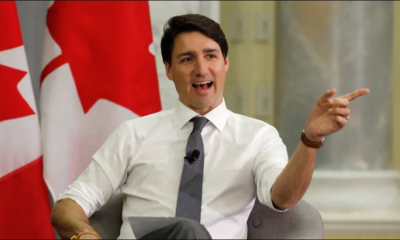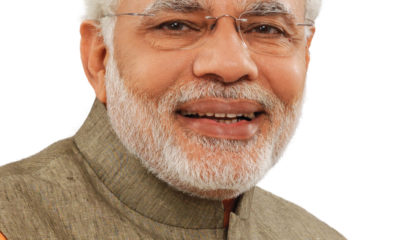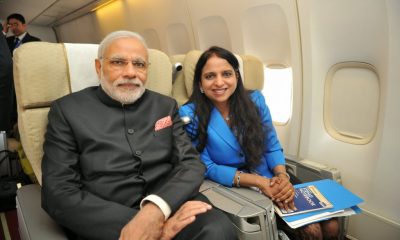World
Obama awards national science medal to Indian American scientist

Washington: US President Barack Obama awarded the National Medal of Science to Indian American scientist Thomas Kailath for his transformative contribution to science and technology.
Kerala-born Stanford University Professor Kailath, 79, received the medal along with 18 of America’s top thinkers, discoverers, and innovators at a ceremony in the East Room of the White House Thursday.
Marvelling both at the amount of brainpower packed into the room and the magnitude of the laureates’ achievements, Obama said: “The results of the work of the people we honour today have transformed our world.”
“Kailath came to this country from India at the age of 22, with a research assistantship that took him to MIT, and then Stanford, where he made critical contributions in information theory and statistics, and mentored more than 100 scholars along the way,” he noted.
Citing Kailath’s remarks that “Scientists are intrinsically hopeful and believe in grand answers, and that if we work hard enough we can find some of them in our lifetime”, the president said: “And that’s a good phrase — ‘intrinsically hopeful’.”
“I’m intrinsically hopeful,” he said amidst laughter and applause. “That’s who I am. That’s who we are as a people, as Americans, as a nation. We’ve had to fight to make stories like the ones here in this room not only possible, but sometimes likely.”
Kailath was honoured for “transformative contributions to the fields of information and system science, for distinctive and sustained mentoring of young scholars, and for translation of scientific ideas into entrepreneurial ventures that have had a significant impact on industry.”
Awarded annually, the National Medals of Science and National Medals of Technology and Innovation are America’s highest honours for achievement and leadership in advancing the fields of science and technology.
Born in 1935 to a Malayalam-speaking Syrian Christian family, Kailath is also a recipient of the Padma Bhushan, one of India’s high civilian awards, and is a member of major science and engineering academies in India.
He received his BE (telecom) degree from the College of Engineering, Pune, before getting his SM and ScD degrees in electrical engineering from the Massachusetts Institute of Technology.
He then worked at the Jet Propulsion Labs in Pasadena, California, before joining Stanford University as associate professor of electrical engineering in 1963.
Kailath’s research and teaching at Stanford have ranged over several fields of engineering and mathematics, with a different focus roughly every decade, according to his profile on the university website.
World
Lockdowns in China Force Urban Communities to Defy Censorship and Vent Frustration Online

Shanghai’s rich middle class is leading a wave of online dissent over the strict and prolonged lockdowns imposed in various parts of the country. Chinese internet censorship is struggling as patience is wearing thin in many urban centers, coming up with creative forms of online protests.
Social Media Posts Revealing Lockdown Tension in Shanghai
Drawn-out lockdowns are nothing new in China as authorities insist with the nation’s zero-Covid policy since the start of the pandemic. Currently over This time around, however, metropolitan areas like Shanghai are increasingly difficult to keep quiet, given that its more than 25 million residents have seen weeks of total isolation along with food shortages and many other service interruptions.
Dozens of towns and reportedly over 300 million Chinese citizens have been affected by lockdowns of different severity. As expected, urban netizens have been most outspoken over their difficulties by finding creative ways to get around state censorship and bans placed on topics, news comments and spontaneous campaigns.
Shanghai residents have been using mobile proxies and hijacking seemingly unrelated hashtags to talk about healthcare issues, delivery failures and the overall severity of their situation. The “positive energy” that the Chinese government wants to transmit during the recent prolonged series of lockdowns does not come naturally to those counting food supplies and online censors are working hard to filter words, trending topics and undesired social media sharing.
WeChat groups and message threads are under constant monitoring. Posts questioning the zero-Covid approach have been quickly deleted, including by leading Chinese health experts like Dr. Zhong Nanshan. Video footage is soon censored and protests and investigations are quickly made to disappear.
Where this has not worked, officials have exposed banners with warnings and outright threats like “watch your own mouth or face punishment”, while drones have been patrolling the city skies. Yet, if anything, this has led to further tensions and unspoken confrontation with Shanghai’s educated and affluent middle class.
Creative Online Solutions Harnessing Civic Energy
Announcements by Chinese social media that they would be publishing the IP addresses of users who “spread rumors” have not helped either. Tech industry research has shown that much of Asia’s tech-savvy population has a habit of using mobile proxies and other privacy tools, quickly finding workarounds to browse the internet freely and talk to the world about the hottest topics.
The sheer volume of forbidden posts is already a challenge for the very censorship system, experts explain. Unable to track all trending hashtags, state workers overlook topics that speak about the US, Ukraine or other popular news. Linking human rights elsewhere to their situation, Chinese online dissidents establish their informal channels and “hijack” the conversation to share personal or publicly relevant information about the Covid suppression in their town.
Sarcastic and satirical posts still dominate. Others hope to evade the censors by replacing words from famous poems or the national anthem. One thing is certain – social media, when harnessed with the right creativity, has proven its ability to mount pressure on the government in even some of the most strictly controlled tech environments like China.























